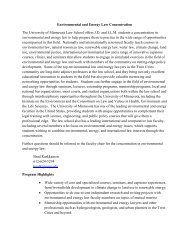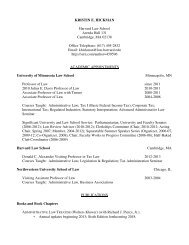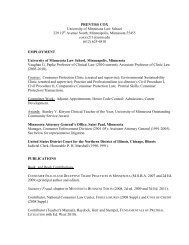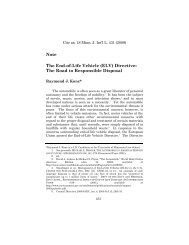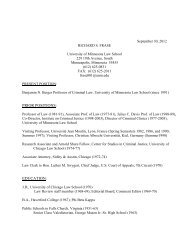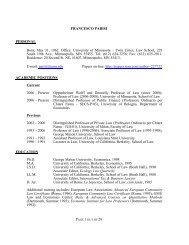Enabling Private Ordering - the University of Minnesota Law School
Enabling Private Ordering - the University of Minnesota Law School
Enabling Private Ordering - the University of Minnesota Law School
Create successful ePaper yourself
Turn your PDF publications into a flip-book with our unique Google optimized e-Paper software.
2009] UMBRELLA CLAUSES 23<br />
2. Limited Protection <strong>of</strong> Investor-State Contracts under<br />
Customary International <strong>Law</strong><br />
The concept <strong>of</strong> State sovereignty also limits <strong>the</strong> power <strong>of</strong><br />
customary international law to stabilize investor-State contracts<br />
ex post. What is primarily lacking in this context is a procedural<br />
remedy for investors to hold host States accountable in an<br />
international forum. Instead, under <strong>the</strong> dualist conception <strong>of</strong><br />
international law <strong>the</strong> relationship between foreign investors and<br />
host States is mediated through an inter-State prism that<br />
requires investors to seek diplomatic protection on <strong>the</strong><br />
international level through its home State. This structure is<br />
generally insufficient because <strong>the</strong> inter-State settlement <strong>of</strong><br />
investment disputes between <strong>the</strong> investor’s home State and <strong>the</strong><br />
host State does not represent an adequate replacement for<br />
dispute resolution directly between <strong>the</strong> foreign investor and <strong>the</strong><br />
host State. Apart from this procedural aspect, customary<br />
international law is also limited as regards <strong>the</strong> substantive<br />
protection <strong>of</strong> investor-State contracts and similar forms <strong>of</strong><br />
investor-State cooperation.<br />
a. Insufficiencies <strong>of</strong> Diplomatic Protection as an Enforcement<br />
Mechanism<br />
International law in its positivist reading as ius inter gentes<br />
posited that “[s]tates solely and exclusively are <strong>the</strong> subjects <strong>of</strong><br />
International <strong>Law</strong>. This means that <strong>the</strong> <strong>Law</strong> <strong>of</strong> Nations is a law<br />
for <strong>the</strong> international conduct <strong>of</strong> States, and not <strong>of</strong> <strong>the</strong>ir<br />
citizens.” 46 Obligations under international law could <strong>the</strong>refore<br />
not exist directly in relation to a foreign investor. Instead, <strong>the</strong><br />
investor was originally considered to be subject only to <strong>the</strong><br />
municipal law <strong>of</strong> <strong>the</strong> host State. 47 Accordingly, a breach <strong>of</strong> <strong>the</strong><br />
host State’s promises was first and foremost a matter <strong>of</strong><br />
municipal law and did not find its direct corollary in<br />
international law. The paradigmatic idea underlying customary<br />
international law was ra<strong>the</strong>r that <strong>the</strong> violation <strong>of</strong> certain<br />
interests <strong>of</strong> foreign nationals through certain government<br />
actions, such as expropriatory or arbitrary conduct, 48 constituted<br />
a violation against <strong>the</strong> alien’s home State.<br />
46. OPPENHEIM’S INTERNATIONAL LAW, supra note 3, § 13, at 18–19.<br />
47. Attempts at <strong>the</strong> internationalization <strong>of</strong> investor-State relations only came<br />
about at a later stage. See Weil, supra note 3, at 157–88.<br />
48. See infra Part II.B.2.b (discussing <strong>the</strong> types <strong>of</strong> State conduct that<br />
international law targeted).



